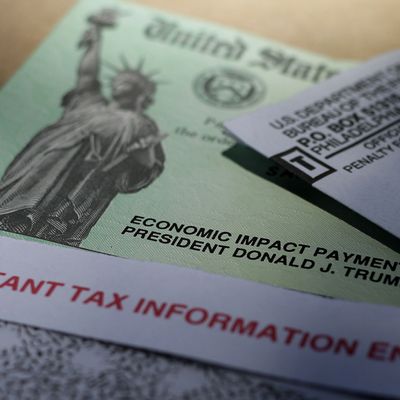
For many Americans who haven’t lost jobs or don’t own businesses, the central feature of the CARES Act — passed in March to offset the economic effects of the COVID-19 pandemic — was its $1,200-per-person payment. Since the economic recovery is slowing down and the pandemic is speeding up, Congress is now trying to reach agreement on a second stimulus package. Here’s everything you need to know about the long push to include a second check in further relief measures, and the latest updates on whether we might actually receive another round of payments.
What Happened With the First Round of Stimulus Checks?
Congress put the IRS in charge of issuing payments to eligible Americans. The amounts varied depending on income and the number of children in the household. Those earning up to $75,000 — or $150,000 for married couples — got the full check; partial payments were available to individuals earning up to $99,000 or couples earning up to $198,000. Parents received an additional $500 for each dependent child.
People who had already given the IRS direct-deposit bank information received the first payments fairly quickly; instead of a paper check, they got a direct deposit. It was tougher for others, which is why some eligible people waited a long time for paper checks, or in some cases, debit cards.
The Democrats’ Stance on a Second Round of Checks
Congressional Democrats (now quietly backed by President-elect Biden) have, in their own proposals, always favored a second round of checks, in amounts similar to the first batch — but only as part of stimulus packages much larger than what Republicans will accept. The Heroes Act the House passed in May, for example, weighed in at over $3 trillion. Most Democrats place a higher priority on other items like supplemental unemployment insurance, aid to cash-strapped state and local governments, and assistance to homeowners and renters. So they remain likely to go along with a second check if proposed, so long as it is not at the expense of other priorities.
The Republicans’ Stance on a Second Round of Checks
The most basic issue congressional Republicans have with a second round of checks is their cost: For months, Senate Republicans have resisted any stimulus package with a price tag over $1 trillion. Thus, their two “skinny stimulus” proposals (both of which were killed by Senate Democrats) did not include provisions for a second round of checks. Some Republicans simply don’t think the economy needs that kind of stimulus, while others favor more targeted aid. Their top priority for new relief legislation has been providing liability shields for corporations facing possible lawsuits related to COVID-19 exposure.
Trump’s Stance on More Stimulus Checks
The Republican congressional leadership had endorsed a last-minute proposal from the Trump administration, unveiled by Treasury Secretary Steven Mnuchin, that included $600 payments per person. After a bipartisan compromise endorsed that proposal and passed in Congress, Trump threatened to scuttle it unless it more than doubled the payments to $2,000 per eligible individual.
Where Negotiations Stand Now
On December 20, Congress passed the $908 billion economic relief package. At first, it looked destined that Trump would sign the bill into law, saving millions of people from losing unemployment benefits and the expiration of a federal moratorium on evictions at the end of the month. Except on December 22, Trump surprised his own party and staff with an impromptu late-night video lambasting the legislation’s $600 payments — again, as his administration and party endorsed — and demanding it be increased to $2,000. Democrats immediately responded by taking Trump up on his offer, while Republicans planned to shoot down their and Trump’s proposal.
After a week of stalling, the president finally agreed to sign the bill on December 27, keeping the federal government running until September 2021 and providing Americans eligible for the initial $1,200 check with $600. He also asked Congress to vote again on $2,000 checks.
In a prudent move on December 28, Speaker Nancy Pelosi called the House to vote on a freestanding bill, the the CASH Act, to bump the $600 stimulus payment to the $2,000 Trump is calling for. All but two Democrats supporting the bill along with the approval of 44 Republicans. On December 29, McConnell blocked a vote on the matter, despite the growing support of Republicans — including Georgia runoff candidates Kelly Loeffler and David Perdue. From here, McConnell could allow the measure to come to the floor as it stands — or load the bill up with provisions that Democrats would not accept, forcing a bipartisan death to the $2,000 idea.
As it happens, McConnell has chosen the latter path, killing the larger checks with poison pills. No change in the amount of stimulus checks is going to occur in this Congress, it appears, though a third check could emerge next year if it seems necessary.
Politico reports that the previously authorized $600 direct payments could be deposited in Americans’ bank accounts before the end of the year.






























